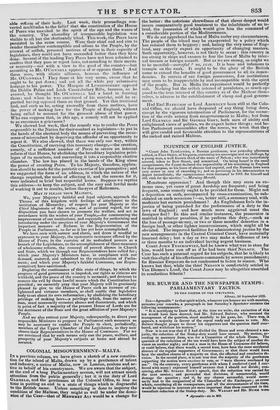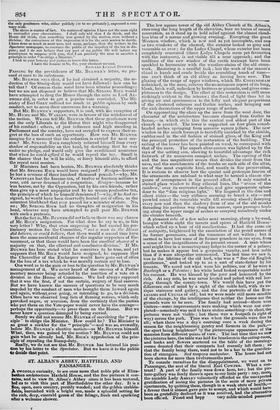MR. BULWER AND THE NEWSPAPER STAMPS: PARLIAMENTARY TACTICS.
TO TIIE EDITOR OP THE SPECTATOR.
Albany, 2d September 1835.
SIR—Agreeable • to that spirit which, whenever you honour me with mention, animates your remarks, a paragraph in last Saturday's Spectator contains the following misstatements : "it is mortifying to know that, at the time we write, the extinction of this tax would have been decreed, had Mr. Edward Bulwer, who assumed the management of the question, stood manfully to his guns, &c. There was, it appears, a majority in favour of the repeal ready and anxious to vote. Mr. Bulwer thought proper to throw his supporters and the question itself over- board, and withdraw his motion."
Now it is not true that if I had divided the House and even obtained a ma- jority, the reduction of the Stamp-duty would have ensued. My motion, ac- cording to necessary form, was for a Committee of the whole House. The question of the reduction of the tax would have been the subject of another di- vision on another night ; and not a man in the House of Commons did believe, or could believe, that there would, a second time, have been the same accidental absence of the regular supporters of Government ; or that there would have been the smallest chance of a majority on that, the effectual and conclusive di- vision. In the second place, it is not true that the majority of the gentlemen supporting the motion were anxious to vote, or "were thrown overboard by me." On the contrary, every gentleman with whom I conferred (and I con- ferred with many) expressed himself anxious that I should not divide; con- ceiving, after Mr. SPRING RICE'S speech, that the reduction was carried for the next session; and persuaded that divisions, if unsuccessful, would damage the question ; and if, by any chance successful, would neces- sat ily lead to the resignation of the Chancellor of the Exchequer ; an event which, considering all its consequences, and all the circumstances of the time, would be injurious to interests yet more important than those concerned in the immediate reduction of the Stamp-duty. Mr. WAICLEY and Mr. Hums were-
• Agreeable—tie in MS.
the only gentlemen who, either publicly (or to me privately), expressed a con- trary wish.
The above is matter of fact. On matters of opinion I have not the same right to contradict your observations. 1 shall only add that I do think, and the House did think, that something was gained by the motion, even without a division: the correctness of this impression it is for the next session to decide. I have done as much as most men, and more, perhaps, than the writers in the Spectator newspaper, to convince the public of the impolicy of the tax in dis- pute; and I do not believe that any part of my public life will induce my countrymen to suppose with you, that I am precisely the man to sacrifice a principle in order "to oblige a Minister." I look to your honesty and justice to insert this letter. I have the honour to be, Sir, your obedient servant,
EDWARD LYTTON RIILWER.
PASSING by the peevishness of Mr. Boeweit's letter, we pro- ceed at once to its substance.
Mr. BULWER -says that, if be had obtained a majority, the re- duction of the Stamp-duty would not have followed : how can he tell that ? Of course there must have been ulterior proceedings; but we are not disposed to believe that Mr. SPRING Rics would have attempted to drag the House through the mire as Lord AL- 21IORP did, in order to get a popular vote rescinded. The Mi- nistry of Earl GREY suffered too much in public opinion by such conduct, not to serve their successors for a warning.
But Mr. Boewsit's supporters, it is said, with the exception of Mr. HUME and Mr. WAKLEY, were in favour of the withdrawal of the motion. We can tell Mr. BULWER that these gentlemen were not the only Liberals in the House that night who disapproved of his conduct : others, of just influence and high standing in Parliament and the country, have not scrupled to express their re- gret at the loss of such an opportunity. How can Mr. BULWER imagine for a moment that the reduction is carried for next ses- sion? Mr. SPRING Ries completely relieved himself from every shadow of responsibility on this head, by declaring that lie was under no pledge, and would only give the conditional assurance that when be could aford it be would repeal the tax. Small is the chance that he will be able, or fancy himself able, to afford the repeal next session.
If Ministers had been beaten, Mr. BULWER absolutely thinks
that Mr. SPRING RICE would have resigned ! Resign—because he lost a revenue of three hundred thousand pounds !—why, Mr. VANSITTART lost the Income-tax, of twelve or fourteen millions a year, and never dreamed of a resignation. Resign—because he was beaten, not by the Opposition, but by his own friends, rather than give up a most unpopular and by no means productive tax, the principle of which lie himself denounced l—w by, if he had re- signed, be would have been deservedly hooted out of office, as the armntest blockhead that ever passed for a minister of state. No, no ; Mr. SPRING RICE had no thoughts of resignation in his head, whoever may have attempted to gull poor Mr. BULWER With such a pretence.
But the fact is, Mr. B u LIVER did not believe there was any chance
of Mr. R10E.S resignation. For what does he say to us, in this very letter ? Why, that even supposing he had carried his pre- liminary motion for the Committee, " not a man in the House did believe, or could believe, that there would a second time have been the same accidental absence of the regular supporters of Go- vernment, or that there would have been the sniallest chance of a majority on that, the effectual and conclusive division." If Mr. BULWER has here stated what he conceives to be true, and yet supposes that Mr. RICE would have resigned, he supposes that the Chancellor of the Exchequer would have gone out of office for the loss of a tax which he was morally certain not to lose.
One word as to the gain or loss to the question by Mr. BULIVER'S management of it. 'We never heard of the success of a Parlia- mentary measure being retarded by the sanction of a vote on a division in the House of Commons. We had always supposed that it was the first, if not the certain, augury of final success. But we have known the success of questions to be very much impeded by the conduct of men who brought them forward again and again, withoot ever going, , or intending to go, to a division. Often have we observed long lists of flaming notices, which only provoked anger, or aversion, from the certainty that the parties who put them on the Vote-paper would never have the courage— perhaps the opportunity—to press them on the House. But we never knew a question damaged by being carried. Surely we did not accuse Mr. BULWER of sacrificing the " prin- ciple " to oblige the Minister. How could he? The Minister is as great a stickler for the " principle"—and was so, avowedly, before Mr. Bunwee's abortive motion—as Mr. BULWER himself. What, therm, was gained by the motion ? Mr. BULWER could not gain what be already had, Mr. Rice's approbation of the prin- ciple of repealing the Stamp-duty.
Really, we do not see that Mr. BULWER has bettered his posi- tion by his letter to the Spectator. But we leave it to the public to decide that point.



























 Previous page
Previous page